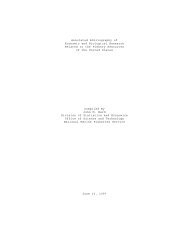West Coast Groundfish Observer Program Manual, Part2 - NOAA
West Coast Groundfish Observer Program Manual, Part2 - NOAA
West Coast Groundfish Observer Program Manual, Part2 - NOAA
Create successful ePaper yourself
Turn your PDF publications into a flip-book with our unique Google optimized e-Paper software.
APPENDIX O<br />
meeting, the Council reviewed the observer program and encouraged the public to comment on the<br />
proposed rulemaking. One individual provided comment during public hearing at the June Council<br />
meeting. The comments are summarized below followed by NMFS’ responses to those comments.<br />
Changes to the Final Rule From the Proposed Rule<br />
The final rule includes the following changes from the proposed rule:<br />
1. Section 660.360 (a) was revised forclarity.<br />
2. In Section 660.360 (c)(2) language was added to clarify that vessels using exempted gear types<br />
could be required to carry an observer under this rulemaking.<br />
3. Section 660.360 (c)(2)(i) was revised for clarity.<br />
4. Section 660.360 (c)(2)(i)(A), addressing departure reports, is revised from the proposed rule to<br />
include language that is intended to provide greater flexibility to vessels that are in port less than 24<br />
hours from the time offloading of catch from one fishing trip begins until the time the vessel departs<br />
on the following fishing trip. Because such vessels expect to be on the fishing grounds at the time<br />
that they are required to submit the next departure report, the owner, operator, or manager of a<br />
vessel is given the option of providing notification to NMFS or its designated agent before departing<br />
on the trip prior to that which the observer coverage may be needed and again at the time offloading<br />
of the catch from the previous fishing trip begins.<br />
5. Section 660.360 (c)(2)(i)(B), addressing departure reports, is revised from the proposed rule to<br />
include language that is intended to provide greater flexibility to vessels that intend to depart on a<br />
fishing trip less than 24 hours after weather or sea conditions allow for departure. This change was<br />
made in response to comment 3 (below). The <strong>West</strong> <strong>Coast</strong> groundfish fleet is composed of many<br />
small vessels, whose fishing schedules are heavily influenced by weather and sea conditions. To avoid<br />
departure delays, the owner, operator, or manager of a vessel who intends to depart on a fishing trip<br />
less than 24 hours after weather or sea conditions become favorable, may choose to inform NMFS<br />
or its agent of his/her intentions at least 24 hours before the expected departure time. After the<br />
initial notification, only an update 4 hours before the expected departure time would be required.<br />
Comments and Responses<br />
Comment 1: The rulemaking is too narrow; it focuses only on observers as a means for collecting<br />
the necessary data at sea.<br />
Response: Other approaches for obtaining total catch data include full retention and data sampling<br />
by vessel personnel. NMFS believes that data collected under these approaches would not meet the<br />
defined management need without adequate verification, such as video systems for monitoring full<br />
retention or observer data to compare to vessel-collected data. Video surveillance systems connected<br />
to global positioning systems are useful in tracking activity by area fished, but do not provide the<br />
necessary total catch data. New digital camera technology has improved the ability to provide<br />
species-specific catch information in particular situations (e.g., fixed gear fisheries with a small variety<br />
of species). The technology is still early in development and is generally considered to be<br />
supplemental to an observer program.<br />
Comment 2: Some boats may not have the ability to carry an observer. Page 19 of the EA notes<br />
that if it is determined that a vessel is simply too small to accommodate an observer alternative<br />
methods of sampling may need to be considered. Under these rules, some sectors of the fishery are<br />
opted right out of any observer program or any meaningful observation without alternatives such as<br />
cameras, or somebody in a zodiac, or full retention, or something like that. Moving forward with an<br />
observer program does not preclude further development of other approaches for obtaining the<br />
necessary total catch data.<br />
Response: Vessel safety and accommodations are individual vessel issues and are not ones that can<br />
be easily addressed. NMFS recognizes that it is likely that some, particularly the smallest groundfish<br />
vessels, may not be safe or adequate for carrying observers. Page 19 of the EA notes that if it is<br />
determined that a vessel cannot safely accommodate an observer, alternative methods of sampling<br />
A-34<br />
1/30/2004
















